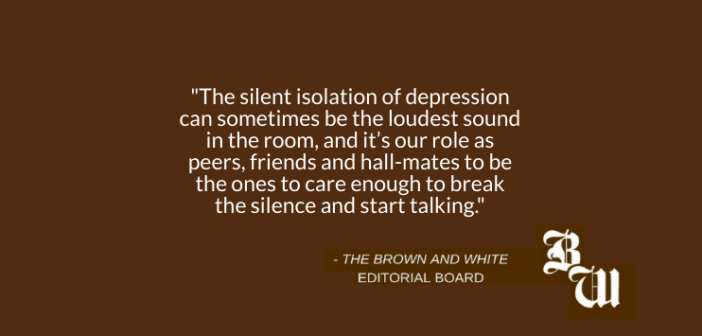Brightness up or down? Contrast? What about the caption? Is it convincing enough?
“Having the time of my life. Ready for the best four years #GoHawks.”
The phone’s blue light illuminates the otherwise dark room. Three missed calls from mom linger in the inbox. She won’t understand, though. Posted. “Looks like you’re thriving,” friends affirm.
Content with the post, you can fall asleep, hoping that your friends’ assumptions will prove to be true the following day. But the cycle repeats itself.
Home friends’ feeds overflow with new faces. Peer groups crowd the dining hall tables. Asking, “Is this seat taken?” no longer seems to be an option as friends file into their respective spots, their places found.
You’ve now learned how to talk to mom and dad. “It’s going great,” usually works for a 15-minute phone call. One post every two weeks reminds friends from home that their assumptions were true. You are having the time of your life.
Friends wouldn’t understand if your reality was different. Right?
But the numbers say otherwise.
A recent study found that 48 percent of college students experience loneliness, and more often than not, go for months feeling isolated. Though we recognized World Suicide Prevention Day on Sept. 10, we must also recognize the reality of students living with depression and suicidal thoughts throughout their college years. As a unified student body, it is our duty to look beyond our own perception and seek out those that are struggling.
Loneliness in America has doubled since 1980, and one in five Americans report feeling isolated when in times of struggle. And while loneliness has varying degrees of severity, loneliness is not taken lightly in the medical field. In fact, U.S. surgeon Vivek Murphy named loneliness a “public health crisis,” and a leading factor in rising suicide rates.
Throughout “the best four years,” it can seem shameful to feel anything but happy. But if we, as Lehigh students, actively acknowledge the presence of anxiety and depression on our campus, we can work to create a healthy environment for all of our peers.
According to American College Health Association survey, 16 percent of college students reported having depression in 2018. And in that same year, 53 Lehigh student were in crisis and 73 had thoughts of suicide, as recorded by the Counseling & Psychological Services.
While Counseling & Psychological Services is an available resource, the silence of those who do not ask for help is equally important to notice.
It’s in the silence. It’s the light that hasn’t been turned on in someone’s room for weeks. It’s the meals they haven’t eaten. It’s the time they stopped showing up.
It’s the silence that demands the attention and action. It’s the silence that does not always mean “I’m fine.”
The silent isolation of depression can sometimes be the loudest sound in the room. It’s our role as peers, friends and hallmates to be the ones to care enough to break the silence and start talking.
Eight hundred thousand lives are lost to suicide every year. And while Lehigh has adequate counseling resources for students struggling with depression or suicidal thoughts, Sept. 10 reminds us to be present with those in our lives and to notice when there is a shift in someone’s behavior.
As students, we are not Lehigh’s Counseling & Psychological Services. Instead, we are friends. We are the table with an extra seat to offer. We are the ones that ask beyond “How are you?” to show we care. We are the makeup of our campus environment, which has the power to either positively or negatively impact the mental health of all students who call Lehigh home.
World Suicide Prevention Day falls once a year. And while it is an important global reminder of the reality of suicide, what happens next lies in our hands. Each day is an opportunity to reach out to someone new, remind them that they are not alone and break the silence.






Comment policy
Comments posted to The Brown and White website are reviewed by a moderator before being approved. Incendiary speech or harassing language, including comments targeted at individuals, may be deemed unacceptable and not published. Spam and other soliciting will also be declined.
The Brown and White also reserves the right to not publish entirely anonymous comments.
1 Comment
Much “loneliness” can be combated by being more friendly with yourself; it’s odd that more and better communication modes seem to have produced more loneliness.
Suicide should not be on the table as a “cure” for depression as well as some other “cures”. Because probably everyone will be depressed to some degree, it would make sense to create a personal plan to cope with it; for those on the high end of the depression spectrum consider a plan mandatory. Depression sucks.